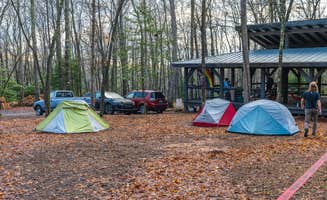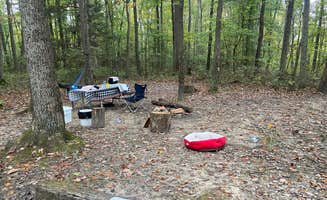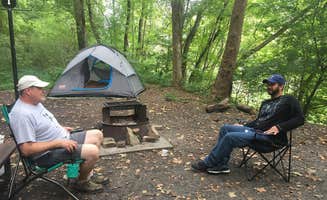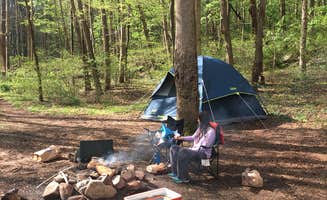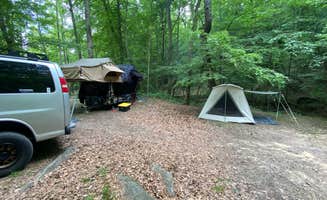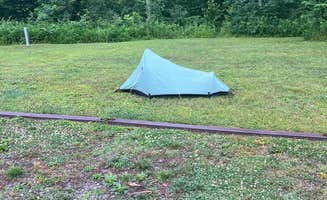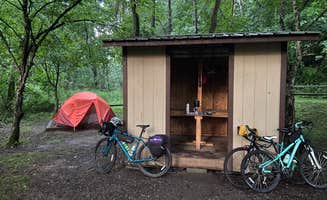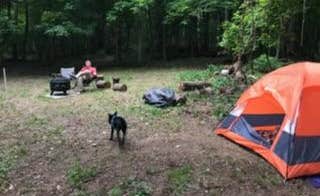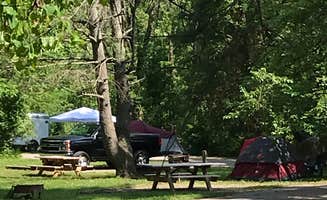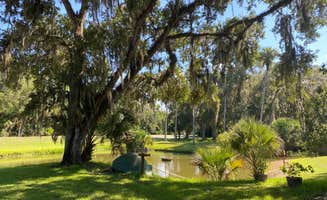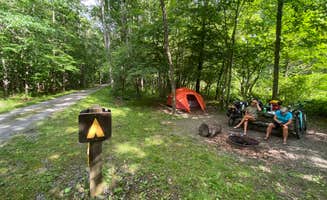Tent campsites near Keslers Cross Lanes, West Virginia sit at elevations between 1,800 and 2,500 feet in the Appalachian Plateau region. Summer temperatures typically range from 60-85°F, with nighttime drops sometimes reaching 50°F even in July. Most primitive campsites in this region receive approximately 45 inches of annual rainfall, with late spring and summer experiencing frequent afternoon thunderstorms.
What to do
River activities year-round: New River Gorge offers excellent fishing, swimming, and paddling opportunities near Stone Cliff Campground. "I loved the experience I had at stone cliff. The camp sites are well marked and maintained. There are some right on the river and a couple more set back closer to the trail. Great spot to set up a hammock, go swimming, or walk on the nearby trails if you aren't climbing," notes one visitor.
Climbing for all levels: The region attracts climbers seeking world-class routes within minutes of camping areas. A camper at New River Gorge Campground shares: "This is a very well thought out campground and is a great option for climbers visiting the area. Each site has a wooden tent platform (10'x10') to set up on, which is a huge plus since the ground is so uneven throughout."
Disc golf access: Several camping areas include recreational facilities beyond hiking trails. "Has a Frisbee/Disc Golf Course. Close to rivers, climbing and hiking activities," mentions one camper about Chestnut Creek Campground. Another camper adds that the disc golf course makes for a fun afternoon activity when not exploring the river.
What campers like
Seclusion between sites: Many tent campgrounds provide natural separation between camping areas. At Chestnut Creek Campground, a camper notes: "This is a quiet campground, with lots of space and site options, run independently by a family. Most sites are simple with just a picnic table and fire pit. There are lots of trees in between many of the sites for great privacy."
Reliable facilities: Despite the primitive setting of many camping areas, bathroom facilities receive consistent maintenance. "The bathhouse is clean, had several stalls, showers, sinks and electricity. The campground charges per person which was different from what I'm used to, but it was very reasonable and comparable to other campgrounds in the area," reports a visitor.
Year-round accessibility: Many camping options remain available during off-peak seasons. A camper at Meadow Creek Campground shares: "Open year round—a no hunting campsite." Another review mentioned: "We visited this campground on April 11. The location was easy to get to and there were lots of open spaces. I practically had the campground to myself."
What you should know
Train noise considerations: Several campgrounds sit near active railroad tracks. "The coal trains run through at all hours of the night—and blow their horns (earplugs)," warns a camper about Meadow Creek. Similarly, at Brooklyn Campground, a visitor notes: "There is an active railroad across the river and there were probably 5-10 trains the Wednesday night that we stayed."
Per-person pricing model: Unlike traditional site-based fees, many campgrounds in this area charge per camper. "The campground charges per person which was different from what I'm used to, but it was very reasonable and comparable to other campgrounds in the area," explains a Chestnut Creek visitor. Current rates average $15 per person per night at most tent sites.
Variable cell service: Coverage depends heavily on specific location and weather. "Cell reception was great all throughout this area. That's not a camping necessity for us, but we all noticed that everyone's phone had great reception with a variety of network providers," shares one camper. However, another notes: "We have Verizon and had 1-2 bars of service while here."
Tips for camping with families
Choose sites with amenities: For camping with children, consider facilities with reliable bathrooms and water access. A visitor to Plum Orchard Lake WMA shares: "This is a beautiful area with plenty of fishing and hiking areas within a 20 mile radius or so. The trees are a beautiful array of color - greens, reds and yellows. The lake is good for swimming but you're welcome to bring your boat, kayak or canoe too."
Prepare for weather changes: Mountain elevation means rapid temperature fluctuations. "It was very cold in the mornings but that was due to going in spring. I can't see it being a problem during the summer," mentions a camper at Stone Cliff Campground. Pack additional layers even for summer camping trips.
Check firewood restrictions: Policies vary between sites regarding collection and outside firewood. "They allow you to use fallen trees/branches for your fires," notes one camper about Chestnut Creek Campground. Others require purchased firewood: "Fire wood can be purchased at the main office."
Tips from RVers
Size limitations enforced: Many campgrounds near Keslers Cross Lanes specifically restrict larger vehicles. At Chestnut Creek, a reviewer cautions: "This is a very nice little campground set up for tents, hammock campers and some car campers. No hook-ups. Definitely not for RVs or Camper trailers."
Access road challenges: Approach roads to several sites present difficulties for larger vehicles. "Long, bumpy dirt road to reach the campsite—it could be fun in the right vehicle," warns a visitor to Plum Orchard Lake WMA. Another camper at a different site notes: "We had no idea there was a steep gravel decline to get to the camp site. My wife and I had brought our hatchback instead of our SUV—so our fault, but if this had been mentioned somewhere then we would have known."
Off-grid preparation essential: No hookups means planning for self-sufficiency. "The water at the site is not potable, so plan accordingly," advises a camper. Most tent camping areas near Keslers Cross Lanes provide vault toilets but require campers to bring all water, power, and supplies needed for their stay.


